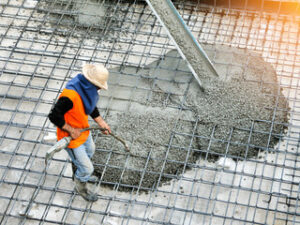Concrete Contractors Greensboro NC is a construction professional who specializes in working with concrete, a critical building material. They have extensive experience with a wide range of concrete projects and can provide valuable insights tailored to your specific project needs.

Look for a contractor who shows a high level of professionalism and customer service. They should be willing to discuss your project in detail and give you a clear estimate that accounts for any potential issues.
Whether you’re building a concrete foundation, driveway, or sidewalk, the experience of your contractor makes all the difference. Contractors with extensive experience are familiar with all aspects of the construction process and can anticipate potential problems before they arise. They’ll also be able to finish the job more quickly, saving you time and money.
Ask your prospective contractors about their work history and the type of projects they’ve completed. Look for a portfolio of past projects and references that demonstrate their skill and professionalism. Ideally, you should select a contractor who has worked on a project similar to the one you’re requesting quotes for.
A qualified, experienced concrete contractor will have the skills and knowledge to deliver a high-quality project on time and within budget. They’ll be able to interpret blueprints and drawings and determine specifications and requirements for the project. They’ll also be able to provide a detailed estimate that includes all materials, labor, equipment, and permits.
You should also ask about the contractor’s work environment and safety policies. A reputable contractor will prioritize safety and follow best practices to ensure the health and wellbeing of their crew and other workers on the job site. They’ll also be familiar with local building codes and regulations related to concrete construction.
A quality concrete contractor will be able to work with a variety of different materials and techniques to achieve the desired result. They’ll use industry-leading tools and technology to ensure a durable, long-lasting finish that looks great. Additionally, they’ll be able to recommend the best concrete mix for your project based on its specific requirements and usage.
You should also consider the contractor’s commitment to customer service. A good concrete contractor will keep you informed about the progress of your project and will respond to questions or concerns promptly. They’ll also be able to coordinate with other construction professionals and subcontractors to avoid schedule delays. In addition, they’ll be able to provide a detailed warranty for their services. This shows their commitment to delivering quality results and a positive customer experience.
Reputation
A contractor’s reputation is important for a project as large as pouring concrete. A well-respected contractor will have the experience to complete your project on time and within budget. They should also be able to explain technical details in an easy-to-understand manner and communicate effectively with you throughout the project’s duration. You can learn more about a contractor’s reputation by checking online reviews and testimonials. You can also ask friends and family for recommendations. When selecting a concrete contractor, look for one who is licensed and insured. This protects you from liability in the event of an accident or damage during the project. Lastly, it is best to choose a local concrete contractor with a good understanding of the area’s unique climate conditions.
A great way to evaluate a potential concrete contractor is by examining their past projects. This will give you an idea of their skill level, quality of work, and customer service. You can also check out their website and social media pages for more information about the company.
Homeowners rely on concrete contractors for a wide range of construction projects, including patios, sidewalks, driveways, and foundations. The quality of these projects has long-term impacts on the safety and value of your home. In addition, it is essential to hire a contractor with a strong commitment to customer satisfaction and quality workmanship.
When choosing a concrete contractor, make sure to get detailed quotes from several companies. The estimates should include a breakdown of costs for labor, materials, and equipment. You should also ask about the contractor’s timeline and how they handle delays.
It is also a good idea to ask about a warranty on the project. A reputable concrete contractor will offer a warranty that covers both materials and workmanship. If a contractor doesn’t offer a warranty, you may want to consider hiring another contractor.
The selection of a commercial concrete contractor is an important part of any building project. These professionals are responsible for creating a solid foundation and ensuring that the project meets all established building codes and regulations. They should have extensive experience in the field and use modern materials and techniques to create durable, aesthetically pleasing structures. In addition, they should be able to respond quickly to inquiries and provide accurate pricing.
License
A concrete contractor license is a specialized credential that allows contractors to undertake concrete-related projects within the construction industry. Obtaining this license is important, not just for legal reasons but also because it shows that the contractor has met certain standards of quality and safety in their work. Licensed contractors are often seen as more credible and experienced than unlicensed ones, which can make it easier for them to secure contracts.
A license is a requirement for anyone who wants to work as a concrete contractor in Hawaii. This license is granted by the state’s board of construction and can be obtained after completing several requirements, including passing a written exam. The exam consists of two parts and covers business law and your trade. The exam can be difficult, so it is important to prepare for it well. There are many resources available online to help you pass the test.
In addition to preparing for the exam, it is a good idea for potential concrete contractors to take classes or participate in study groups. These can help them learn the material faster and improve their chances of success on the exam. Additionally, a concrete contractor should have excellent attention to detail. This is especially important when working with different types of concrete and in challenging conditions.
Another way to gain experience and prepare for the exam is to join an apprenticeship program. This is a great way for newcomers to the concrete contracting industry to get started and learn from an established general contractor. In most cases, apprentices are paid a salary while they learn the trade.
Many states have different licensing requirements for construction contractors, and some require a minimum amount of experience to qualify for a license. To ensure that you meet the requirements for your specific location, it is a good idea to contact the local building department or construction regulatory agency to find out more information about the license requirements in your area.
In addition to a license, concrete contractors must have excellent communication skills and the ability to work with other contractors to complete projects on time. They must also be able to work under pressure and stay on budget. Having these skills will help them succeed in their careers and keep their clients happy.
Insurance
Concrete Contractors work in an industry that is inherently high risk. The heavy materials, specialized equipment, and hazardous job sites all contribute to a greater potential for liability issues. Because of this, it is essential for Concrete Contractors to have comprehensive insurance coverage that mitigates risks and ensures business success.
General liability insurance is a key element in any Concrete Construction business, but there are other policies that can help with specific insurance needs. For example, contractors may need to carry workers’ compensation, commercial auto, and inland marine insurance to cover their various risks.
Workers’ Comp
If a employee gets injured on the job, it can be costly for a Concrete Contractors company to pay for their medical bills and lost wages. Workers’ compensation is designed to mitigate this risk by providing financial protection for employees who are injured or become ill because of their employment.
Commercial Auto
If employees need to travel between jobs, having a commercial auto policy is important. This type of insurance covers the cost of their vehicles and any damage that might occur while in transit to and from jobsites.
Tools & Equipment Coverage
Whether on the jobsite or in storage, concrete contractors have expensive and valuable equipment that is vulnerable to theft and loss. Tools and equipment coverage, also known as inland marine insurance, protects these assets from common hazards such as weather, theft, and vandalism.
Pollution Liability Coverage
If your concrete contractors are working on a construction site, they may be exposed to environmental liabilities such as silica and mold. While these aren’t typically covered by general liability, pollution liability insurance can provide protection in the event of a claim.
When selecting a Concrete Contractor, ask for proof of insurance and their licensing and bonding information. A reputable contractor will be happy to provide this documentation, and you can feel confident that they are well-insured in case of an accident or dispute. Additionally, examining the quality of their previous work and client references can be a good indicator of their reliability and expertise. If possible, try to request examples of projects that were completed more than 5 years ago so you can see how the finish work has held up over time.
